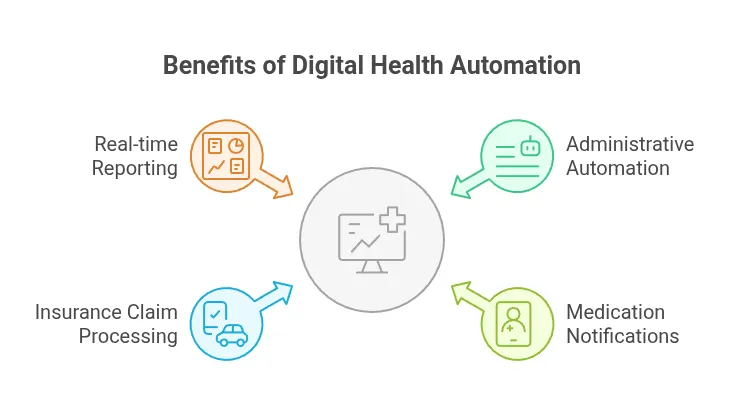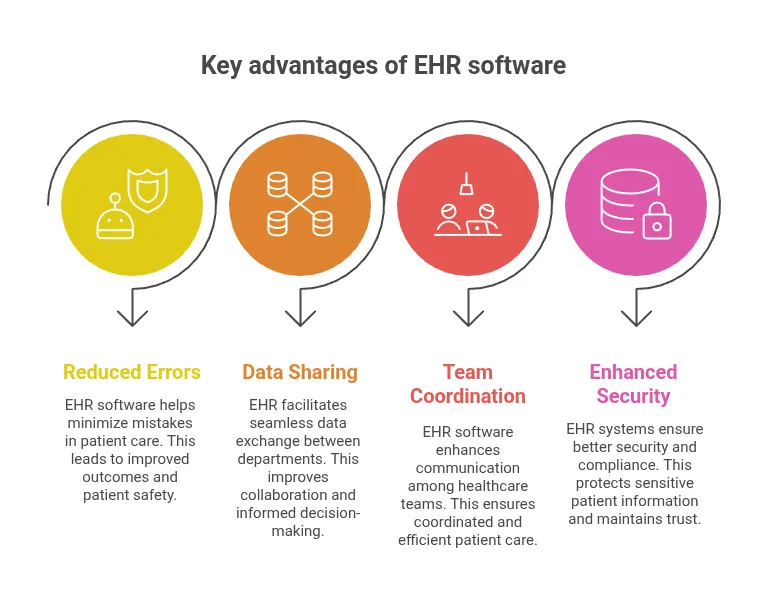Table of Contents
Healthcare has changed a lot in the past few years. Patients’ outcomes have improved, errors have been reduced, and decision-making has been faster. Healthcare software development is the reason; the benefits of software development for healthcare are apparent, and all health apps, like EHR software, benefit us in many ways.
Let’s discuss this further to understand.
Why Healthcare Needs Modern Software Solutions
In this age of technology, Legacy systems can keep up with the power modern software brings to healthcare, faster, better, and accurate work.
With all the benefits of health apps, life expectancy of serious patients increases, patients get satisfied with the care provided, and nurses provide better care with less administrative work blocking them.
With increasing demands for telemedicine, personalized treatment plans, and remote monitoring, modern software enables care continuity, even beyond hospital walls, and healthcare software development companies help providers link these services into one connected system.
To move forward with healthcare, modern software isn’t just a necessity anymore; it’s a must.
Operational Efficiency and Automation Benefits

One of the most critical digital health advantages is operational automation.
Manual tasks, like scheduling appointments, billing, inventory management, and generating lab results/reports that took hours, can be done in just a few seconds with the help of custom-made healthcare software.
Custom healthcare software allows for:
- Automation of administrative tasks.
- Regular smart notification for medications.
- Faster insurance claim processing.
- Real-time reporting and analytics.
With this kind of automation, we get more digital health benefits, significant cost reduction, and allow healthcare staff to take on more healthcare roles than manual administration tasks.
Enhanced Patient Experience and Engagement
Patients expect a one-day treatment cure, just like ecommerce or banking apps, fast transactions, or one-day delivery.
Health apps tailored to specific patient needs improve interaction, transparency, engagement, and trust.
Benefits of health apps include:
- 24/7 access to personal health data.
- Telemedicine consultations.
- Real-time symptom tracking.
- Prescription refill reminders.
- Secure communication with doctors.
By putting power in the hands of patients, healthcare providers foster trust, loyalty, and better health outcomes.
Improved Data Management and Compliance

Data is the lifeblood of modern healthcare, and managing it efficiently is crucial. EHR software benefits include centralized patient records, reduced paperwork, and accurate medical histories, all accessible in just a few clicks.
Furthermore, compliance with HIPAA, GDPR, and other regulations is easier with software designed to meet security standards.
Features like role-based access, encryption, audit logs, and secure cloud storage ensure data integrity and privacy.
Key advantages include:
- Reduction in medical errors.
- Sharing of data across multiple departments.
- Healthcare teams can easily coordinate with each other.
- Enhanced security and regulatory compliance.
Real-World Benefits: Case Examples
1. Bridging Legacy Medical Equipment with Modern EHR Systems (IoT Integration)
A leading healthcare organization faced substantial challenges with integrating legacy serial port–based medical devices into their modern EHR system. HyScaler devised a robust IoT-based solution:
- Hardware bridge using Raspberry Pi and Python to transmit serial data via TCP/IP.
- Custom application server developed in GoLang to convert ASTM protocol data from devices into HL7 format for seamless EHR ingestion, using REST APIs and MQTT.
- Security & compliance ensured via encrypted, authenticated data transmission in adherence to HIPAA standards.
Results: Real-time syncing of patient vitals into EHR, elimination of manual data entry errors, greater interoperability, and secure, compliant data flow
2. EHR Integration for Senior Living & Care Organizations
HyScaler partnered with a senior living and care provider to integrate EHR into their care management workflow.
Utilizing Umbraco CMS, jQuery, and other web technologies, the project connected resident records and care plans with administrative tools.
This integration streamlined data sharing, reduced redundancy, and improved coordination across departments—enhancing both resident management and caregiver efficiency
3. Website & Portal Modernization for Healthcare Management Services
A healthcare management services provider in the U.S. was using a core-PHP–based site that lacked scalability and modern features.
HyScaler migrated the site to a custom WordPress CMS design while preserving brand identity and integrated key plugins (e.g., Contact Form 7, Advanced Access Manager, Profile Builder).
Benefits included:
- Automated workflows for scheduling, billing, and reporting
- Improved data accuracy and revenue-cycle management
- Enhanced site performance, security, and user experience
- Cost savings and positive stakeholder feedback
Why These Case Studies Matter:
| Challenge | Software Solution | Outcome |
| Legacy medical devices are incompatible with EHR | IoT bridge + custom server + protocols conversion | Real-time clinical data; fewer manual errors |
| Disparate systems in senior care | EHR integration via web portal | Streamlined workflows and accurate resident care |
| Outdated site for healthcare admin | Modern CMS + custom plugins | Automation, improved UX, security & cost savings |
These cases reinforce the earlier points: digital health solutions empower operational efficiency, boost patient care, harmonize data management, and ensure compliance.
Conclusion
These HyScaler case studies showcase how custom software development in IoT, CMS, and integration delivers real-world benefits across operational, clinical, and administrative in healthcare.
By addressing legacy systems and modernizing platforms, healthcare organizations can unlock significant improvements in efficiency, patient outcomes, compliance, and cost-effectiveness.
FAQ
Q1. What are the key benefits of healthcare software development?
Healthcare software boosts operational efficiency, cost savings, enhances patient engagement, ensures compliance, enhances interoperability, and allows for seamless data management. It enables healthcare providers to offer faster, safer, and more personalized care.
Q2. How does custom software improve hospital operations?
Custom software aligns with a hospital’s specific workflows, automating tasks like patient registration, billing, and inventory management. It reduces administrative burden, minimizes errors, and increases overall productivity while complying with regulations of data security.
Q3. Can software development improve patient care?
Absolutely, Through telemedicine, patient portals, health monitoring apps, and AI-based diagnostics, software development directly enhances the quality and speed of patient care.